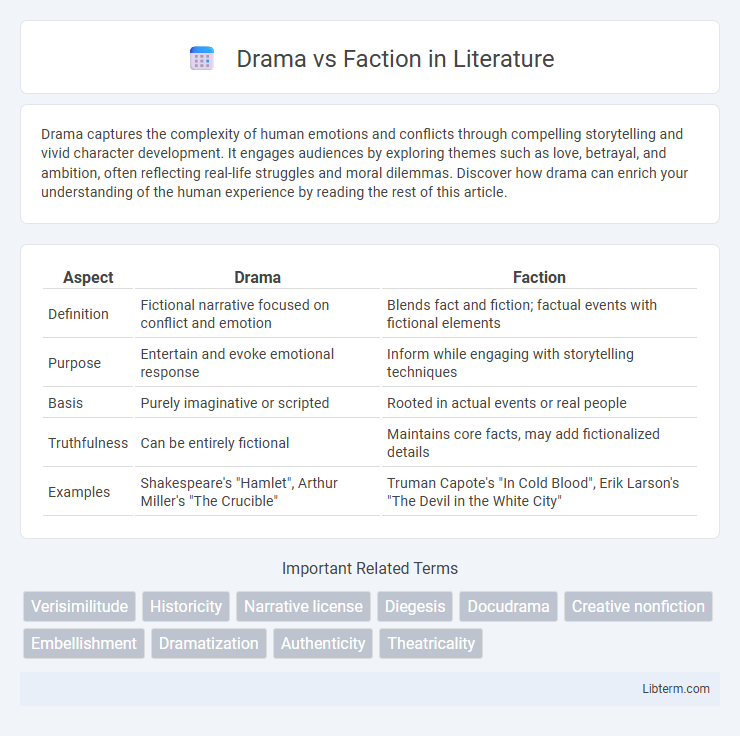Drama captures the complexity of human emotions and conflicts through compelling storytelling and vivid character development. It engages audiences by exploring themes such as love, betrayal, and ambition, often reflecting real-life struggles and moral dilemmas. Discover how drama can enrich your understanding of the human experience by reading the rest of this article.
Table of Comparison
| Aspect | Drama | Faction |
|---|---|---|
| Definition | Fictional narrative focused on conflict and emotion | Blends fact and fiction; factual events with fictional elements |
| Purpose | Entertain and evoke emotional response | Inform while engaging with storytelling techniques |
| Basis | Purely imaginative or scripted | Rooted in actual events or real people |
| Truthfulness | Can be entirely fictional | Maintains core facts, may add fictionalized details |
| Examples | Shakespeare's "Hamlet", Arthur Miller's "The Crucible" | Truman Capote's "In Cold Blood", Erik Larson's "The Devil in the White City" |
Understanding Drama and Faction: Key Definitions
Drama refers to scripted or improvisational performances that explore intense emotions, conflicts, and character development through a structured narrative. Faction combines factual events with creative storytelling, blending reality with fiction to enhance engagement while maintaining a basis in truth. Understanding these definitions clarifies the distinction between purely artistic expression and narrative forms grounded in real-world contexts.
Historical Origins of Drama and Faction
Drama originates from ancient Greek theatrical traditions, where performances combined storytelling, music, and acting to explore human emotions and societal issues. Faction, a term often linked to political or social groups, historically emerged as a means to describe organized dissent or competing party interests within states or communities. The divergence between drama as a cultural art form and faction as a socio-political phenomenon highlights their distinct but occasionally overlapping roles in shaping historical narratives.
Core Elements of Drama: Plot, Conflict, and Emotion
Drama centers on the intricate interplay of plot, conflict, and emotion to engage audiences through storytelling. The plot serves as the structured sequence of events driving the narrative forward, while conflict introduces tension and challenges that characters must navigate, fueling interest. Emotion enhances the depth of the experience by eliciting empathy and connecting viewers to the characters' inner struggles and transformations.
What Defines Faction: Fact-Based Storytelling
Faction blends factual events with narrative techniques to create engaging, fact-based storytelling. It emphasizes historical accuracy while incorporating character development and dialogue to enhance viewer connection. This genre bridges documentary and drama by grounding its plot in real-world facts supported by thorough research.
Differences in Storytelling Techniques
Drama emphasizes emotional depth and character development, using dialogue, inner conflict, and nuanced interactions to engage the audience. Faction blends factual history with fictional elements, relying on a balance between accurate events and creative storytelling to maintain authenticity while enhancing narrative appeal. The storytelling in drama prioritizes subjective experiences, whereas faction intertwines objective reality with imaginative detail.
Impact of Drama vs Faction on Audience Perception
Drama intensifies audience engagement by evoking strong emotional responses, creating a more immersive experience that heightens empathy and relatability. Faction, blending factual information with narrative elements, shapes audience perception by delivering credibility alongside entertainment, fostering informed reflection and trust. The interplay of drama and faction influences how viewers process and internalize content, impacting memory retention and emotional connection.
Popular Examples of Drama and Faction in Media
Popular examples of drama in media include TV shows like "Breaking Bad" and movies such as "The Godfather," which focus on emotional conflicts and character development. In contrast, faction, often referring to a blend of fact and fiction, is exemplified by works like "The Crown" and "Chernobyl," where real historical events are dramatized for narrative impact. These genres cater to audiences seeking either intense emotional storytelling or engaging interpretations of true events.
Ethical Considerations in Drama and Faction
Drama often explores ethical dilemmas through complex character interactions, highlighting moral ambiguity and personal values. Faction combines factual events with narrative storytelling, raising ethical concerns about accuracy, bias, and the potential manipulation of truth. Both forms require careful consideration of the impact on audience perception and the responsibility to represent ethical issues with integrity.
Why Choose Drama or Faction: Purpose and Effect
Drama emphasizes emotional depth and character development, creating an immersive experience that fosters empathy and reflection. Faction blends factual information with narrative elements, aiming to educate while engaging the audience through storytelling. Choosing drama appeals to those seeking emotional resonance, whereas faction suits readers interested in learning facts within a compelling context.
The Future of Drama and Faction in Contemporary Narratives
The future of drama and faction in contemporary narratives lies in the integration of factual accuracy with compelling storytelling, enhancing audience engagement through authenticity and emotional depth. Emerging trends show a rise in hybrid genres where dramatized true events are presented with nuanced character development and multimedia formats. This evolution reflects growing audience demand for narratives that inform and entertain while maintaining credibility and creative expression.
Drama Infographic

 libterm.com
libterm.com